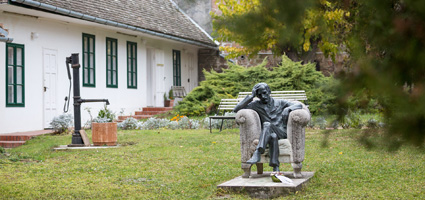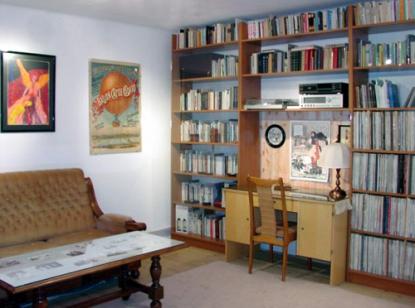2025. April 24. Thursday
Mihály Babits Memorial House - Szekszárd
 |
Address: 7100, Szekszárd Babits Mihály utca 13.
Phone number: (74) 312-154
E-mail: wmmm@terrasoft.hu
Opening hours: Temporarily closed.
|
Museum tickets, service costs:
|
Individual ticket for adults
|
2000 HUF
|
|
|
Group ticket for adults
(min. 25 people)
|
1500 HUF
|
/ capita
|
|
Individual ticket for students
|
1000 HUF
|
|
|
Individual ticket for pensioners
|
1000 HUF
|
|
|
Individual combined ticket for adults
(the exhibitions of Szekszárd)
|
4000 HUF
|
|
|
Photography
|
1000 HUF
|
|
|
Video
|
1000 HUF
|
The world of the poet is conjured up by his library, desk and personal articles. The poet Baka István was one of the most important reformers of role-play poetry. He was also a writer and translator. He was born in Szekszárd on 25 July 1948.

Baka István graduated from the Russian Faculty of the Garay János Grammar School in 1966. He spent his school years in a self-study group, drama group, recited poems, played music read Dostoyevsky in Russian.
During 1967-72, he attended the Hungarian-Russian Department of the JATE. He met Ilia Mihály who was the first to publish his poems in the magazine named Tisztáj. He spent a whole school year in Leningrad in 1971-72. He read samizdat literature first in Leningrad. He discovered the poems of Mandelstam, Szosznora, Brodszkij. He understood Hungary's state as a province. Affected by his understanding, he began to call himself an 'internationally committed poet'.
He began a teaching career in Szekszár at the Medical Secondary School in 1972. In 1974 he began working for 'Kincskereső'. He was the editor of the magazine from 1993 until his retirement. The room of the editor was one of the most important intellectual workshops in Szeged. He held a very successful translation course at the University of Szeged in 1993.
His poetry was greatly influenced by music. The sonata form of his poems came from his experiences with music.
He died on 20 September 1995 in Szeged after his long illness. He was buried in the Cemetery in Szekszárd.

Baka István graduated from the Russian Faculty of the Garay János Grammar School in 1966. He spent his school years in a self-study group, drama group, recited poems, played music read Dostoyevsky in Russian.
During 1967-72, he attended the Hungarian-Russian Department of the JATE. He met Ilia Mihály who was the first to publish his poems in the magazine named Tisztáj. He spent a whole school year in Leningrad in 1971-72. He read samizdat literature first in Leningrad. He discovered the poems of Mandelstam, Szosznora, Brodszkij. He understood Hungary's state as a province. Affected by his understanding, he began to call himself an 'internationally committed poet'.
He began a teaching career in Szekszár at the Medical Secondary School in 1972. In 1974 he began working for 'Kincskereső'. He was the editor of the magazine from 1993 until his retirement. The room of the editor was one of the most important intellectual workshops in Szeged. He held a very successful translation course at the University of Szeged in 1993.
His poetry was greatly influenced by music. The sonata form of his poems came from his experiences with music.
He died on 20 September 1995 in Szeged after his long illness. He was buried in the Cemetery in Szekszárd.
